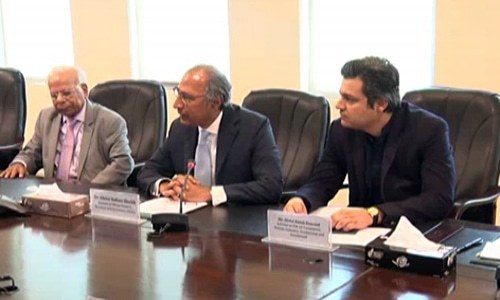IMF economist Dr Reza Baqir appointed SBP governor for 3 years

President Arif Alvi has approved the appointment of Dr Reza Baqir, a long-time economist with the International Monetary Fund (IMF), as the governor of the State Bank of Pakistan (SBP) for a period of three years, a notification issued by the Finance Division said on Saturday.
The senior economist of Pakistani origin will replace Tariq Bajwa, who was unexpectedly removed from the post on Friday along with the Federal Board of Revenue (FBR) chairman.
A notification said the federal government in pursuance of a federal cabinet decision had accepted the resignation tendered by Bajwa as the central bank's governor on May 03 "with immediate effect".
"The President of Pakistan is pleased to appoint Dr Reza Baqir as Governor State Bank of Pakistan for a period of three years from the date he assumes office," a subsequent notification read. It said the terms and conditions of his appointment will be notified later with the president's approval.
Who is the new SBP head?
The IMF website lists Dr Baqir as the Fund's current Senior Resident Representative for Arab Republic of Egypt.
It wasn't immediately clear whether he would relinquish his post at the global lender before taking charge of the SBP governor office.
He had previously served as the Head of Mission for Romania at the IMF following his appointment in January 2016, according to the Centre for Economic Research in Pakistan.
As per his executive profile posted by Bloomberg, Dr Baqir has been with the IMF since 2000 as the head of the Debt Policy Division.
A graduate of Harvard University, he later obtained a PhD in economics at the University of California, Berkeley.
The new SBP governor has worked with the World Bank, the Massachusetts Institute of Technology and the Union Bank of Switzerland.
SBP governor shown the door
Tariq Bajwa had confirmed to Dawn on Friday that he was asked to resign while he was in Islamabad for talks with the IMF that are supposedly "progressing" according to prime minister’s adviser on finance Hafeez Shaikh, who has recently replaced finance minister Asad Umar.
But when asked if this change and the removal of the FBR chairman during the IMF talks might send a negative signal to the markets, Shaikh said: “I hope the markets are going to look at our actions and decide. They have to see the totality of the actions and our policies.”
It was unclear how the change of such senior and important officers will affect the talks with the IMF.
Both men seemed to have been taken by surprise, as FBR chairman Jahanzeb Khan was scheduling meetings for Saturday till late Friday night when the news of his departure flashed across news TV screens.
Similarly, Bajwa was participating in what many consider the last leg of negotiations with IMF before the finalisation of a programme.
Both Bajwa and Khan are Grade 22 officers of the Pakistan Administrative Service, though the former was appointed after his retirement. There was little indication in the days leading up to the removal about unhappiness with Bajwa's performance. However, about the FBR head, both former finance minister Umar and Prime Minister Imran Khan had given public statements expressing their disappointment over his performance.
Sources in the finance ministry, who were privy to the developments, had told Dawn that the FBR chairman was viewed by PM Khan as "a mediocre person", lacking dynamism, and was held largely responsible for the lacklustre revenue performance since his appointment. The FBR is on course to register one of the highest shortfalls of its history by the close of this fiscal year, anticipated to come in above Rs350 billion.
The sources said the recently appointed finance adviser agreed with the prime minister’s views, and seemed to be moving to bring in his own team to manage the country’s finances.
Both the SBP governor and the FBR chairman are key players in any IMF programme. The governor is actually one of the signatories to any programme, and the FBR chairman is tasked with meeting the revenue target that usually lies at the heart of any programme.












































